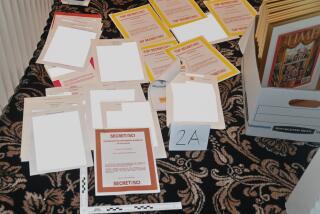If You Like Decoder Rings, Here’s a Not-So-Secret Service
If you have access to the Internet, you have access to a weapon so powerful the federal government has banned its export to any foreign country.
It’s not a bomb or a gun, nor does it require equipment beyond a run-of-the-mill home computer and a modem. It takes only a few hours to set up, costs nothing, is completely silent and even has a silly name.
It’s Pretty Good Privacy (PGP), an encryption program. It turns ordinary messages into unfathomable gibberish that without a proper decoding “key” would probably take more than a lifetime to decipher.
Last week the Clinton administration announced a revised policy on PGP and similar programs. Taking the position that these programs allow terrorists and other criminals to communicate with impunity, Vice President Al Gore said the government would eliminate export restrictions only if a system could be devised for law enforcement agencies to “tap” into these coded communications.
Currently, there are no restrictions on the domestic use of PGP, although numerous law enforcement officials say they would like to see them introduced. On the other side of the argument are civil libertarians who believe unrestricted PGP is a boon to free speech.
Code-making schemes have existed throughout history--from the scytale in ancient Egypt to the Enigma machine used by the German military during World War II.
PGP makes these schemes look like the decoder rings once found in cereal boxes. It’s based on the work of computer scientist Whitfield Diffie, who in 1975 invented “public-key cryptography.” In 1991 PGP hit the Internet.
That’s where my cyber-buddy Peter and I picked it up last week, deciding we would use it to pretend we were spies, having to get secret plans across enemy lines (from Pasadena to Santa Monica).
Separately, we downloaded PGP from its home on the World Wide Web at https://web.mit.edu/pgp, where it’s available in Macintosh and DOS formats. Before downloading, we had to click on a box to confirm we were in the United States. (Of course, a spy outside the U.S. could just as easily click that box. Government policy seems blind to the fact that the Internet knows no borders.)
PGP may be a brilliant program, but it’s hardly user-friendly. The 37-page manual that comes as part of the download reads as if it had been loosely translated from Latvian.
Finally, we each successfully created two electronic keys, one secret and the other public. The secret key stays inside the computer. The public one can be e-mailed to anyone with whom you want to communicate. Both keys are needed to read a coded message.
So, Peter sent me his public key, which I used to transform a short message into gibberish he could read after passing it through his secret key. When he did, he found a quote from English lexicographer Samuel Johnson, who wrote: “The vanity of being known to be trusted with a secret is generally one of the chief motives to disclose it.”
* Cyburbia’s e-mail address is david.colker@latimes.com.
More to Read
Sign up for Essential California
The most important California stories and recommendations in your inbox every morning.
You may occasionally receive promotional content from the Los Angeles Times.










